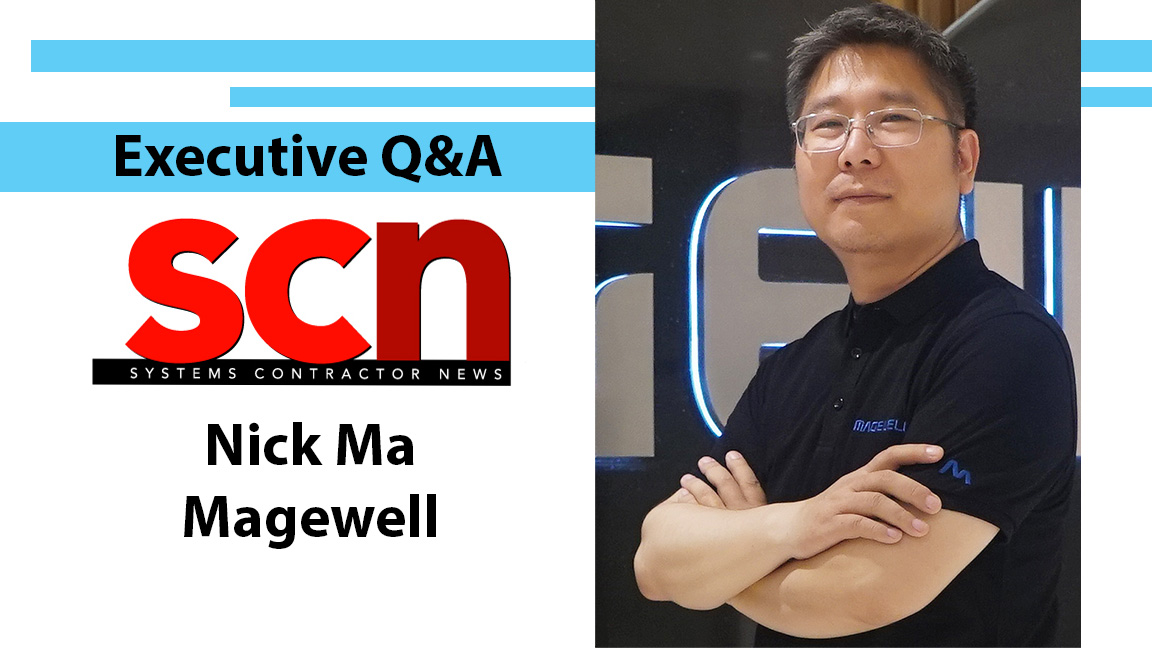Executive Q&A: A Time of Transition
Magewell CEO/CTO Nick Ma helps prep customers for the move to IP infrastructures.

A daily selection of features, industry news, and analysis for AV/IT professionals. Sign up below.
You are now subscribed
Your newsletter sign-up was successful
SCN: How long have you been with this company, and what are your responsibilities?
Nick Ma: I co-founded Magewell in 2011, and I have a joint role as CEO and CTO. As CEO, I lead the development of the company’s short-term and long-term business strategies, oversee execution of our mission and corporate values, and make top-level executive decisions. As CTO, I evaluate technology advances to ensure our product roadmap addresses customers’ current and future needs.
SCN: How has your background prepared you for your role?
NM: My education prepared me for my CTO duties, while my professional experience prepared me for my CEO role. Passionate about electrical engineering since high school, I worked as a software engineer after graduating from university.
[InfoComm 2022 Watchlist: Magewell's Pro Convert AES67 Set to Debut]
The working environment was unpleasant, which drove me to establish a workplace that employees could enjoy. I co-founded a software startup in 2001 and gained a lot of experience in how to run a company. I learned a lot from some great business leaders I worked with, and at Magewell, I have fantastic colleagues who complement my own experience.

SCN: Earlier this year, you announced a partnership with Barco. How important has videoconferencing become for your business?
NM: Videoconferencing has always been a popular use case for our plug-and-play video capture devices, allowing people to easily bring HDMI or SDI signals from video cameras or wired screenshares into conferencing software. As the use of videoconferencing software grew exponentially during the pandemic, it became an even bigger portion of our business. Videoconferencing is intrinsic to AV environments’ “new normal,” and we’re excited to partner with Barco and other innovators to enhance user experiences and expand the source signals they can incorporate.
A daily selection of features, industry news, and analysis for AV/IT professionals. Sign up below.
[Executive Q&A: InfoComm Gets Back to Business]
SCN: As a company that provides solutions in both areas, what should integrators tell clients to expect when migrating them from a traditional HDMI or SDI signal architecture to an IP-based workflow?
NM: First, customers who have investments in HDMI or SDI equipment such as cameras don’t need to jettison all of their existing gear. Solutions such as our Pro Convert family seamlessly bridge baseband signals with IP-based workflows, extending the lifecycle of that gear.
Some people know AV very well, some know IT very well, but the real value today is being an expert in how they intersect.
AV-over-IP enables one-to-many distribution without expensive routers, distribution amplifiers, and extenders, but the network architecture becomes crucial. You’re often transporting multiple signals over the same IP network, so bandwidth considerations become an important factor. Integrators will need to work closely with the customer’s IT staff to optimize the infrastructure.
SCN: You offer products for multiple streaming approaches, from software-based streaming to standalone appliances like the Ultra Stream. What are the advantages of each approach?
NM: Our standalone streaming appliances such as Ultra Stream and Ultra Encode are designed to make live streaming exceptionally easy, even for non-technical users. Both can also be integrated into third-party software solutions through an API, allowing users to manage the devices through software they’re already using.
For users who prefer to encode and stream in software, our USB Capture devices bring an HDMI or SDI signal into Windows, Mac, Linux, or ChromeOS applications. Software-based streaming typically offers the greatest creative flexibility, but some customers may find using a standalone hardware device simpler.
SCN: Last year, Magewell celebrated its 10th anniversary. What changes in the AV industry have most impacted your business over the last decade?
NM: The market is now embracing trends we’ve been advocating for since we started: the transition from traditional AV signals to IP-based infrastructures, and the use of software-based solutions rather than dedicated hardware. We were a bit ahead of some Pro AV vertical markets in these respects. The live production market was faster to begin these transitions, but that gave us the opportunity to refine our feature sets for Pro AV users. As streaming became mainstream and software-based conferencing took off, our solutions were perfectly positioned to help customers take advantage of these technologies.
SCN: Where do you see the Pro AV industry heading?
NM: I believe the transition to software and AV-over-IP will keep accelerating, although hardware will still be needed to bridge them with traditional signals. I also expect to see greater adoption of open standards. While the broadcast market has long embraced open interoperability standards, the use of IP in Pro AV has been characterized by multiple, proprietary specifications. Embracing open standards in Pro AV will free customers from having to stay within any particular vendor’s ecosystem.
SCN: What are the short and long-term goals for Magewell, and what new initiatives are we likely to see from your company?
NM: Our goal has always been to offer solutions that make the latest technologies so practical, simple, and affordable that they achieve “technical invisibility”—where the technology is so easy to use and pervasive that you don’t even notice it any more, you just use it naturally. In the short term, we want to continue improving the hybrid meeting user experience not only for large companies, but also small and medium-sized businesses with limited infrastructure budgets. Beyond that, we’re looking to efficiently stream higher-quality AV at lower latency beyond the boundaries of local networks.
[Best Practices: Today’s Hybrid Corporate Classroom]
SCN: How can systems contractors better position themselves to profit from products and/or services you have to offer?
NM: Gain as much IT and IP networking expertise as you can. Some people know AV very well, some know IT very well, but the real value today is being an expert in how they intersect. The move to software, streaming, and IP also opens up new customer types that you might not have focused on previously. Small and medium-sized businesses can take advantage of solutions that would have previously only been affordable to bigger enterprises. Also, consider service-based revenue models, such as remotely managing devices for your customers through tools like our Magewell Cloud.

Mark J. Pescatore, Ph.D., has been the content director of Systems Contractor News since 2021. During his career, he's hosted and programmed two ongoing regional industry trade shows (including Future B2B's AV/IT Summit), produced and hosted podcasts and webinars focused on the professional video marketplace, taught more than a dozen college communication courses, co-authored the book Working with HDV, and co-edited two editions of The Guide to Digital Television.
